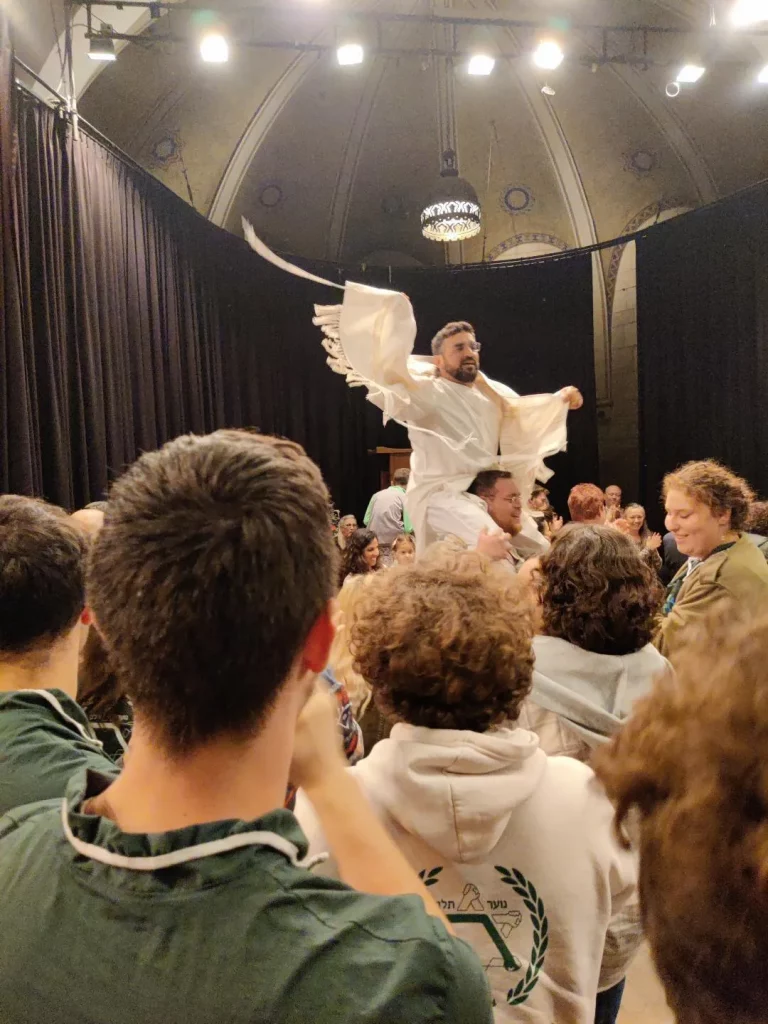The Rabbi and AI: How and Where Will the Almighty Find Me?


Young Mizrahi Rabbi Celebrates with His Community
Professor Joe Goldblatt
A Jewish Rabbi turned to me and provided a specific answer to my question. Normally, Rabbinical thinkers are trained to answer a question with another question to stimulate intellectual thought. However, my question was posed in the middle of the Covid – 19 global pandemic and I asked him how he continued to bring his community closer to the almighty when they temporarily could not come to his synagogue.
The experienced Rabbi raised his eyes to the heavens and whispered to me “God has moved.”
I then asked him what did he mean and he mentioned the use of video live streaming of services as one way to continue to engage with his community members. He said that occasionally he conducts Zoom or FaceTime one on one video calls to provide counselling for his flock and he and his members found this very effective and comforting.
Perhaps that is why this year at the start of Rosh Hashonah, the Jewish new year, I felt compelled to go to YouTube and for the first time in 73 years search for a different spiritual thinker. I entered in the search enginge Shortest Rosh Hashonah Sermon.
In the blink of an eye a young female Rabbi was looking at me from New York City whilst she was standing behind the pulpit at Temple Emanuel which is one of the largest, historic, and most prestigious liberal synagogues in America.
I shared the good news with my wife that I had been successful and she, as usual,, looked at me skeptically.
However, perhaps I should first provide the context for my need for an electronic spiritual advisor to help me locate a Rabbi who would provide a short sermon in my home.
About three years ago my wife and I decided to join an on – line community of Jews who are disabled and therefore unable to attend a traditional synagogue. We found the one hour service inspiring and we were actively able to participate by actively assisting with the technological platform to insure maximum inclusivity of the 25 people who were worshiping from hospitals as well as their homes. Some had not left their homes in many years..
This year I received an email from the Rabbi of the disabled community telling me and others that due to her poor health she could not conduct services this year. I was devastated. Surely I thought there must be an alternative service I could attend, where I could be helpful, however, after many hours of futile searching to find a similar service, I realised that none existed.
I then turned to my wife and asked if she would like to create our own service this year. I selected my favourite prayer book and used Post It notes to mark readings for each of us to share, however, when I reached the sermon section I drew a blank. I knew that my wife would not wish to hear my sermon and she would not want the burden of creating one herself.
That is the spiritual moment my search began. I first researched the average length of a Rabbi’s sermon which according to my advisor AI ranges from 20 to 28 minutes although some Rabbi’s have shortened their sermons to range from 10 to 15 minutes to continue to engage their listeners. When I saw that longer average sermon timing I realised immediately why many times I have felt uncomfortable in a traditional place of worship, whether it be Jewish, Christian, or other. The longer sermon, unless written and delivered by a very wise and eloquent person with a stentorian voice, no longer appealed to me and no longer held my attention.
My AI spiritual advisor immediately referred me to a young smiling assistant Rabbi who provided both of us with a captivating 10 minute and 46 second sermon about authenticity and equality. During her sermon she managed to tell two entertaining stories, connect her message to the Torah (the Jewish bible), and impress me with her vocal eloquence. (Not once, despite her youth, did she begin a sentence with “So … “)
I then began to think about my other AI advisors Alexa and Siri. Alexa has about 77 million followers and Siri reaches and follows the commands of 500 million people globally. That is some future community for Rabbis and other members of the global clergy to perhaps better get to know.
My friend the Rabbi had earlier told me in his wise voice that the Almighty had indeed moved during the pandemic. He used the example of teleconferencing as one example and I now believe that due to the ubiquity of the internet and soon AI, the Almighty will not easily return to the traditional brick and mortar place of worship and therefore we must instead find other ways to offer spirituality to others.
The main challenge with an AI versus the wisened Rabbinical opinion is the lack of AI’s ability to thoughtfully ask and be asked further in – depth questions, to empathise deeply with life’s troubles and challenges, and to provide the kind of sensitive counselling that only a life that has been fully lived may have the experience to offer.
AI, in my view, is not life. Rather, it is a replication or representation of life experiences recorded and then regurgitated to somehow meet the individual broad needs of the questioner.
Perhaps that is why each morning when I raise my eyes toward heaven and recite my Jewish prayers (including the Lord’s Prayer, written by a Jewish man named Jesus), I look up with mystery, gratitude and seeking an answer to my daily challenges. Some days that answer arrives in the smallest of voices from the birds out with my window.
I am not sure AI can stimulate that kind of deep thought although I am sure they could produce thousands bird sounds upon demand. Therefore, for now, I shall continue searching AI for those short, informative, intellectual, and inspiring sermons that might just make me think more deeply about myself and our world.
For me, I believe that AI shall not anytime soon replace our pulpit Rabbis, however, I am also sure that although the Almighty may have moved, our most successful Rabbis will continue to find ways of connecting their flocks with him, her, or them to continually seek deeper spiritual experiences.
Professor Joe Goldblatt is Emeritus Professor of Planned Events at Queen Margaret University. His views are his own. For more information about his views visit www.joegoldblatt.scot
